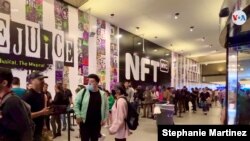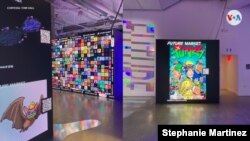Promoters of Web3 say that this digital revolution is destined to transform the Internet, but can it cause global social and economic change? According to industry leaders, that is precisely what it will do.
“It is an extraordinary opportunity and now with the volatility that is approaching in certain Latin American countries and throughout the [efecto] post-pandemic and the economic blows that there were for the entire Latino community outside and inside the United States and in Latin America,” he told the voice of america María Jimena Londoño, co-founder of Disrupt3rs, a company that helps creators navigate the Web3 ecosystems.
“The possibility of working remotely showing our talent, acquiring sources of payment in different currencies such as cryptocurrenciesis going to open the giant doors for us to generate income in a non-traditional way”, added Londoño.
According to experts, it will do so thanks to its decentralization system.
“At least in Mexico we have seen the weakening of civil society organizations. Budgets and support have decreased enormously, so that undoubtedly greatly weakens the structures that are small in themselves and always go against the tide, ”he explained to the VOA Ernesto Miranda, founder of Squada.
“So the financing, decision-making and organizational capacity mechanisms that exist in Web3 can end up being a sustainable palliative to the intrinsic weaknesses that it has, since everything that has to do with social impact or with activism or with organizations of the civil society, mainly in our countries where there are so many challenges and so much need”, he pointed out.
Miranda, a Mexican entrepreneur, founded Squada in order to help different communities to enter the space and take advantage of its benefits.
“What we have achieved so far has been to be able to convince important groups of communities that are normally underrepresented in the digital ecosystem, such as in a project we did with dancers from the National School of Dance or by having constant conversations with minority groups such as indigenous communities about the possibilities that exist in the Web3. About the risks that exist. Always trying to have an open approach and trying to avoid issues of cultural appropriation or replicating colonial models,” Miranda said.
Non-Fungible Tokens (NFTs)
According to Miranda, one of the tools with which this approach can be achieved is non-fungible tokens (NFT) as digital art that not only benefit those who receive the funds but also the creators.
“NFTs have therefore been crucial in being able to make a more walkable bridge for people who don’t necessarily understand technological issues, so I think that’s it. The challenges are to explain it, convince them of the benefits and also convince them that they are long-term projects”, added Miranda.
“We started with a newspaper, with a magazine where we didn’t have any information. We then jumped to an Instagram Facebook where we create content, but the content ends up belonging to the owners of the platform and Web3,” explained Laura Rodriguez, Web3 entrepreneur and founder of The Miami Ape.
decentralization
“In Web3 what we are trying to achieve and that little by little we are going to achieve that, is decentralization, where you are the real owner of your content,” Rodriguez said in statements to the VOA.
The benefit of this decentralized system, explains Gigi Skarlett, founder of Crypto Tech Women. is that all transactions are recorded in a kind of digital book or record called blockchainthus providing more transparency to the spending of funds.
“There is proof of each person who donated. There is proof of how these funds are being used,” Skarlett said.
“I think it is also inspiring for the Latin American region what can come from building a much more balanced and balanced post-pandemic world, where we can really seize these technologies and stop depending on intermediaries who ultimately end up being the ones who get all the benefits not only economic but also social in the digital ecosystem”, added Miranda.
Rules and regulations
According to Pablo Enrique Segarra, legal advisor to Web3, some of the challenges when trying to raise funds in this area are taxation, money laundering and “know your client” laws.
“If you create an NFT project and don’t go through the process of finding out who exactly is buying your NFTs, which a lot of projects don’t do today, you’re taking a big risk. For example, what if a Russian oligarch or drug dealer buys your NFT and makes money off of it?” Segarra surmised.
“Another aspect with which you have to be careful is the fiscal component. In the United States, if you don’t have a real entity and you can’t pay taxes, you are personally responsible for what happens to your NFTs,” added Segarra.
Connect with the Voice of America! Subscribe to our channel Youtube and turn on notifications, or follow us on social media: Facebook, Twitter and Instagram.






![[Img #74675]](https://thelatestnews.world/wp-content/uploads/2024/12/They-discover-a-new-class-of-X-ray-sources-in-the-150x150.jpg)











Add Comment